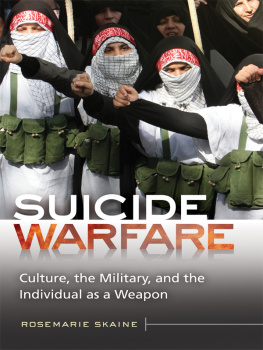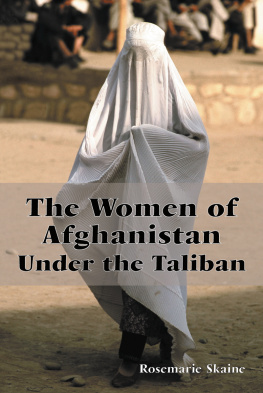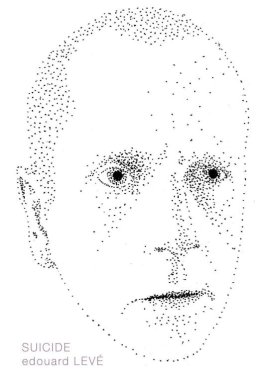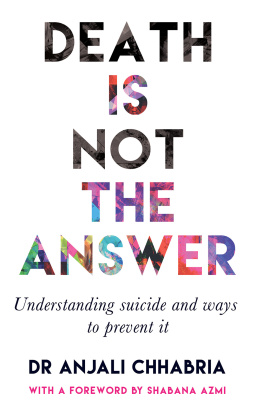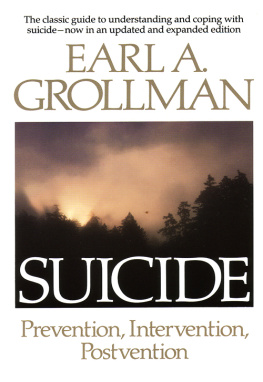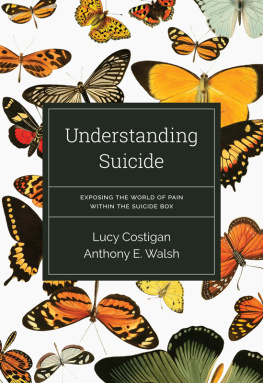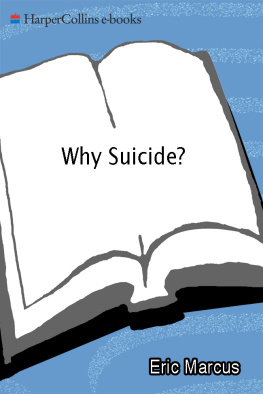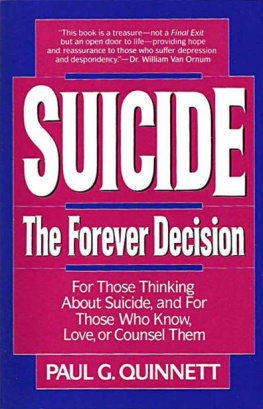Acknowledgments
My deepest appreciation extends to my editor, Maxine Taylor, Military History, for her expertise, guidance, and encouragement that assisted to achieve the best possible result. Special appreciation is extended to Sasikala Rajesh, Project Manager, and her staff for the production of this book.
I thank the following individuals for their interviews: Marie Breen-Smyth, chair of international politics, codirector of Centre for International Intervention, and director of research at the School of Politics, University of Surrey, Guildford, U.K.; Max L. Gross, former senior research fellow on the Islam in Southeast Asia project at the Center for Strategic Intelligence Research, Joint Military Intelligence College, Washington D.C., and former dean, School of Intelligence Studies, Joint Military Intelligence College; Richard Jackson, professor of international politics at Aberystwyth University, U.K., and author of several articles and books on terrorism studiesmost helpful were his books Conflict Resolution in the 21st Century: Principles, Methods, and Approaches and Critical Terrorism Studies: A New Research Agenda; and Rear Admiral D. M. Williams, Jr., USN (Retd.), former commander, Naval Investigative Service (NIS) Command.
I am appreciative to Karunya Jayasena, terrorism analyst at California State University, Northridge, for her literature review and to Jordan Derhammer, Cedar Falls, Iowa, for technical support.
Finally, I am grateful to my husband, James C. Skaine, for the support and assistance, to family members, Richard L. and Nancy L. Craft Kuehner and William V. and Carolyn E. Guenther Kuehner, and to my friend, Wanda Pape. I am appreciative to my writing colleague Captain J. Michael Brower, U.S. Army (Retd.), for his enthusiasm and support. For his lasting gift of inspiration, I thank Cass Paley, friend and mentor.
APPENDIX
Documents
A. PRESIDENT GEORGE W. BUSH, THE NATIONAL SECURITY STRATEGY, PREEMPTIVE SELF-DEFENSE, THE BUSH DOCTRINEEXCERPT
We will disrupt and destroy terrorist organizations bydefending the United States, the American people, and our interests at home and abroad by identifying and destroying the threat before it reaches our borders. While the United States will constantly strive to enlist the support of the international community, we will not hesitate to act alone, if necessary, to exercise our right of self-defense by acting pre-emptively against such terrorists, to prevent them from doing harm against our people and our country. Given the goals of rogue states and terrorists, the United States can no longer solely rely on a reactive posture as we have in the past. The inability to deter a potential attacker, the immediacy of todays threats, and the magnitude of potential harm that could be caused by our adversaries choice of weapons, do not permit that option. We cannot let our enemies strike first. For centuries, international law recognized that nations need not suffer an attack before they can lawfully take action to defend themselves against forces that present an imminent danger of attack. Legal scholars and international jurists often conditioned the legitimacy of pre-emption on the existence of an imminent threatmost often a visible mobilization of armies, navies, and air forces preparing to attack. We must adapt the concept of imminent threat to the capabilities and objectives of todays adversaries. The United States has long maintained the option of pre-emptive actions to counter a sufficient threat to our national security. The greater the threat, the greater is the risk of inactionand the more compelling the case for taking anticipatory action to defend ourselves, even if uncertainty remains as to the time and place of the enemys attack. To forestall or prevent such hostile acts by our adversaries, the United States will, if necessary, act pre-emptively.
Source:The National Security Strategy of the United States of America (Washington, D.C.: Government Printing Office, September 2002), http://georgewbush-whitehouse.archives.gov/nsc/nss/2002/index.html.
B. PRESIDENT BARACK OBAMAS ACCEPTANCE OF THE NOBEL PEACE PRIZE, OSLO, NORWAY, DECEMBER 10, 2009, JUST WAREXCERPT
I do not bring with me today a definitive solution to the problems of war. What I do know is that meeting these challenges will require the same vision, hard work, and persistence of those men and women who acted so boldly decades ago. And it will require us to think in new ways about the notions of just war and the imperatives of a just peace.
We must begin by acknowledging the hard truth: We will not eradicate violent conflict in our lifetimes. There will be times when nationsacting individually or in concertwill find the use of force not only necessary but morally justified.
I make this statement mindful of what Martin Luther King Jr. said in this same ceremony years ago: Violence never brings permanent peace. It solves no social problem: it merely creates new and more complicated ones. As someone who stands here as a direct consequence of Dr. Kings life work, I am living testimony to the moral force of non-violence. I know theres nothing weaknothing passivenothing navein the creed and lives of Gandhi and King.
But as a head of state sworn to protect and defend my nation, I cannot be guided by their examples alone. I face the world as it is, and cannot stand idle in the face of threats to the American people. For make no mistake: Evil does exist in the world. A non-violent movement could not have halted Hitlers armies. Negotiations cannot convince al Qaedas leaders to lay down their arms. To say that force may sometimes be necessary is not a call to cynicismit is a recognition of history; the imperfections of man and the limits of reason.
I raise this point, I begin with this point because in many countries there is a deep ambivalence about military action today, no matter what the cause. And at times, this is joined by a reflexive suspicion of America, the worlds sole military superpower.
But the world must remember that it was not simply international institutionsnot just treaties and declarationsthat brought stability to a post-World War II world. Whatever mistakes we have made, the plain fact is this: The United States of America has helped underwrite global security for more than six decades with the blood of our citizens and the strength of our arms. The service and sacrifice of our men and women in uniform has promoted peace and prosperity from Germany to Korea, and enabled democracy to take hold in places like the Balkans. We have borne this burden not because we seek to impose our will. We have done so out of enlightened self-interestbecause we seek a better future for our children and grandchildren, and we believe that their lives will be better if others children and grandchildren can live in freedom and prosperity.
So yes, the instruments of war do have a role to play in preserving the peace. And yet this truth must coexist with anotherthat no matter how justified, war promises human tragedy. The soldiers courage and sacrifice is full of glory, expressing devotion to country, to cause, to comrades in arms. But war itself is never glorious, and we must never trumpet it as such.
So part of our challenge is reconciling these two seemingly irreconcilable truthsthat war is sometimes necessary, and war at some level is an expression of human folly. Concretely, we must direct our effort to the task that President Kennedy called for long ago. Let us focus, he said, on a more practical, more attainable peace, based not on a sudden revolution in human nature but on a gradual evolution in human institutions. A gradual evolution of human institutions.
What might this evolution look like? What might these practical steps be?

